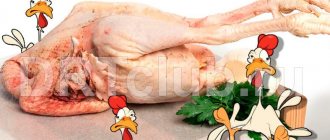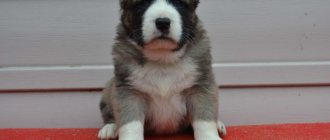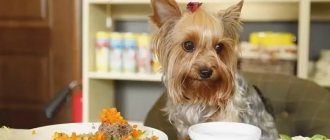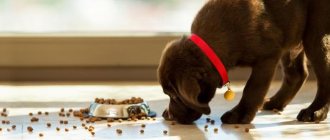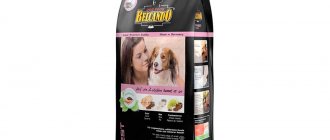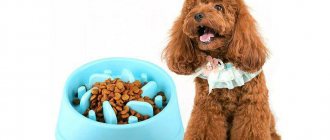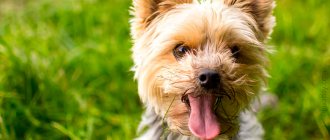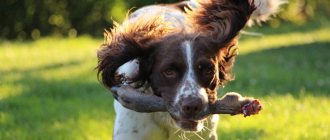What should you feed a dachshund puppy so that the inquisitive and flexible baby does not turn into a “fat sausage” with crooked legs? During adolescence, a dachshund puppy's skeleton grows rapidly and muscles form , so the baby must receive a sufficient amount of essential nutrients, vitamins and microelements. An important condition is to maintain the proportions of proteins, fats and carbohydrates so that your pet does not develop obesity and heart and joint pathologies.
Breed Features
Despite their short legs and unusual cute appearance, dachshunds are born burrow hunters with increased attentiveness, instant reaction and a balanced nervous system. An adult dog is distinguished by a calm character, impeccable obedience and submission to the will of the owner. Thanks to his extraordinary intelligence, this cute pet has been a favorite of many families for several centuries.
IMPORTANT!!! Dachshunds were favorites of Napoleon Bonaparte, who, when dying, left orders to bury the bodies of the adorable dogs in his grave.
The small dog has a loud voice, its menacing bark sounds scarier than that of many large breeds of dogs. A properly raised pet will not lunge at people or animals for no apparent reason. Despite its short stature, the animal copes well with the functions of a guard and protector of the family.
Basic feeding rules
Given the small stomach volume of a growing baby, it is customary to feed dachshund puppies in small portions several times a day . The frequency of feeding and the size of portions varies depending on age. It is advisable that the puppy has breakfast no earlier than 7 am and dinner no later than 10 pm, and equal time intervals between feedings must be observed.
Snacks between feedings are allowed only with tiny pieces of fruit as a reward; it is unacceptable to treat your dog with human food.
Remember! The habit of snacking on junk food leads to obesity, the development of allergies, pathologies of the heart and musculoskeletal system.
- A dachshund puppy can be fed with ready-made food or traditional food, but until the age of 3 months, giving your baby commercial food is prohibited.
- The main rule with a natural diet is to introduce a new product into the menu of a small pet from a very small amount with a gradual increase in volume.
If you overfed your dog
Keep in mind that this breed especially should not be overweight because it has short legs and will not be able to move easily. This harms stable heart muscle. When your pet has gained unnecessary weight, then it is better to put him on a diet, give him low-fat food and less food. For example, you can give kefir in the morning, 3 tablespoons of meat for lunch, and stewed vegetables in the evening.
If you feed your dog one food, then you need to replace it with less fat content. Physical activity and long walks will also help you lose weight.
It is also important not to miss the point that a small pet constantly wants to chew on something, and these can be completely different objects. Therefore, it is better to keep an eye on what the puppy is trying to eat. Foreign objects will harm the digestive system. When you notice that your pet is chewing on pieces of furniture or slippers, it is better to immediately punish the puppy, teaching him discipline.
Choosing a place and utensils for feeding
Most often, small puppies eat so actively that liquid and dry food contaminants remain on the walls and floor of the feeding area. Considering the likelihood of constant cleaning, it is better to feed your cute baby in non-residential rooms - the kitchen or bathroom.
The place for feeding should be the only one and constant for the entire life of the small pet, so the issue of choosing a place and utensils for feeding must be taken care of even before acquiring a little friend.
Very young dachshund puppies can be fed from a small saucer. As the pet gets older, its muzzle will stretch out, so the grown-up baby will need to be fed from a deep bowl.
It is recommended to immediately purchase two bowls: one for food, the other for water. After each feeding and in the evening, you need to wash both bowls in running water.
- You should not buy ceramic bowls
- Plastic dishes for a dachshund should be made of high-quality durable material so that the dog cannot chew it while changing teeth.
- The optimal dishes for dachshunds are stable, deep bowls made of stainless steel. This material is strong, durable and hypoallergenic.
What to feed a dachshund puppy
Today, there are two main feeding schemes for puppies: natural diet and ready-made food. Veterinary specialists focus on using traditional food specifically for raising babies; breeders and dog handlers are more inclined to use high-quality ready-made food.
Both feeding schemes have their pros and cons, so what to feed the dachshund puppy is up to the owner of the cute pet to decide.
Natural diet
If the owner of the puppy has decided to raise the baby on a natural diet, he will need to prepare fresh food from high-quality products several times a day. It is very important to correctly observe the proportions of nutrients. Given the propensity of dachshunds to allergies, it is necessary to monitor the dog’s reaction to each newly introduced product.
The following products are suitable for feeding:
- Meat – beef, veal, turkey, lamb. Chicken often causes allergies in Dachshund puppies, so it can only be introduced with control of the allergic reaction.
- By-products – boiled beef liver, kidneys, heart, stomach.
- Boiled sea fish without bones - cod, blue whiting, pink salmon.
- Milk. Many dachshunds cannot digest whole milk, so you can replace it with fermented milk products. If milk is digested well, it is given only up to 4 months of age.
- Fermented milk products - cottage cheese, fermented baked milk, kefir, yogurt, calcined cottage cheese.
- Eggs are given to babies raw or boiled.
- Cereals . From a very early age, babies are fed semolina, rice, oatmeal, barley and buckwheat milk porridge. Porridge is boiled in water and diluted with warm meat broth.
- Vegetables, fruits, and herbs are given raw or boiled with a small amount of vegetable oil and nuts. Dachshunds happily eat carrots, zucchini, bell peppers, pumpkin, beets, cauliflower, apples, pears, berries, dill, parsley, and cilantro.
- Additives - cheese, seaweed, salt, vegetable oil, bran, rye bread or flour.
Ready-made feed
Despite the recommendations of veterinary specialists not to use dry food for raising puppies, most breeders and dog trainers successfully raise healthy dogs on ready-made food.
If a dog owner decides to feed a small dachshund with industrial food, he should pay attention to the line of low-calorie food for puppies of small breeds of dogs from the super-premium class.
High-quality food has a balanced, carefully verified composition and a full range of vitamins and microelements; it is easy to give according to the dosage indicated on the packaging. When using industrial food, the owner spends a minimum of time preparing and cleaning the room after feeding the pet.
The disadvantages of high-quality food are their high cost and the content of carcinogenic substances that negatively affect the health of a small dog.
Advice: You should not purchase a large amount of dry food at once because of the possible manifestation of an allergic reaction in the baby.
Mixed diet
The mixed diet is a source of controversy among experts and amateurs, but it is very often used by eminent breeders to raise healthy dogs. With this diet, you cannot mix dry food and natural products in the same bowl at the same time due to the different mechanisms of their digestion.
Porridge
There is debate about the benefits of cereals. However, the number of fans of buckwheat and rice is not decreasing. Porridge is steamed in water and served warm along with meat, kefir, and fermented baked milk. Hercules and millet are practically not absorbed by the dog’s body, and semolina is too fatty.
Porridge is given mainly in the cold season. A dog should eat no more than 20% of the entire portion of buckwheat and rice per day.
In summer, vegetables are used instead of porridge. To add flavor and increase their beneficial properties, chopped herbs – parsley and dill – are added.
Sample dachshund puppy menu by age
With a natural diet, meat and fish make up 50%, 20% vegetables, 20% dairy products, 10% porridge. Let's look at a sample menu for a dachshund puppy by age.
Up to a month
Up to a month, the cubs feed 6 times a day with mother's milk. From 3 weeks, one feeding can be replaced with rice or semolina porridge with milk, low-fat cottage cheese with kefir or meat baby food.
It is necessary to give new food on an empty stomach, immediately after sleep. Porridge and cottage cheese are given 30 g each, meat puree – 5-10 g.
1 month
At 1 month, buckwheat, carrots and boiled meat are introduced into the little friend’s diet. Meat can be given boiled and twisted with porridges or as part of thick soups. It is recommended to grate carrots on a fine grater and mix with a small amount of vegetable oil. Every day the puppy is given cottage cheese, kefir, porridge, meat and vegetables.
Advice! You can make a healthy and tasty toy from whole carrots.
A one-month-old baby should receive 50 g of fermented milk products and cereals, 30 g of meat and 20 g of vegetables.
2 months
At 2 months, the puppy already eats 5 times a day, the baby begins to try new foods: spaghetti, noodles, rye bread, grated cheese, cabbage, bell peppers, zucchini, pumpkin, apples, pears. Every day you can introduce one new product while monitoring the reaction of the puppy’s body.
A two-month-old puppy can eat boiled and raw eggs no more than 2 times a week. A raw egg can be given with cottage cheese or milk, a boiled egg can be mixed with porridge.
Daily intake for a two-month-old puppy: 40 g of meat, 100 g of dairy products, 70 g of cereals, 70 g of vegetables.
3 months
At 3 months, 4 meals a day are introduced; the puppy can be given boneless sea fish in the form of small meatballs. The pet continues to eat cereals, soups, vegetables and meat. A three-month-old dachshund can try raw beef or veal with 2 g, gradually increasing the portion. Lamb, turkey and chicken are boiled and twisted, served with cereals, vegetables and herbs. Also, bran and seaweed are added little by little.
At 3 months, the puppy receives 60 g of meat, 250 g of dairy products, 100 g of cereal and 100 g of vegetables.
Reviews
Andrey, Belgorod
“When I adopted the puppy, the breeder advised me to feed him Hill's food. I decided to try it and was pleased with its quality. Robie is active, healthy and handsome. Besides, eating this way doesn’t give me any trouble.”
Varvara, Chelyabinsk
“At first I fed Bella food. I bought meat, cereals, and dairy products. But then I realized that giving food is much easier. Moreover, the quality is not inferior to meat and dairy dishes.”
Vitamins and supplements
Up to a year, the formation of bones, teeth and muscles occurs, so it is very important that the growing baby’s body is provided with vitamins and microelements in order to avoid the development of rickets and pathologies of the musculoskeletal system.
If the puppy eats ready-made super-premium food containing yeast, omega-3 acids, vitamins and mineral supplements, then the owner does not have to buy additional expensive medications.
A natural diet, especially in winter, is not able to meet the vitamin needs of a small dog. They are produced in liquid and dry form, premixes are mixed with the main food and fed to the kitten.
Basics of a proper table
Already in the very approach to a dog’s diet, the views of their owners differ. Some believe that a pet needs to receive exclusively natural products and its nutrition is no different from human nutrition. Other owners trust food manufacturers more and prefer to simply pour puppy food out of a pack. Both approaches are possible, because both natural food and specially developed dog food contain a sufficient number of useful elements and vitamins.
When purchasing this hound breed, it is recommended to temporarily leave the same regime and table that the breeder had. This way you will eliminate unwanted allergies and help your baby adapt to a new place. Then gradually begin to accustom the animal to a new diet, which you plan to follow throughout its life.
Water
When raising a dachshund puppy, close attention must be paid not only to the freshness of food and the brand of finished food, but also to the quality of drinking water. Musty or stale water can cause intestinal disorders and even death in growing plants. Up to a year, it is advisable to give your beloved pet filtered or bottled water, which must be changed 2-3 times a day.
Before pouring a new portion of fresh drink, it is necessary to thoroughly rinse the bowl under running water to wash off the remaining liquid with the animal’s saliva and pathogenic microflora.
When raising a short-legged pet exclusively on dry food, a lack of fluid leads to the development of urolithiasis, so it is recommended to monitor the filling of the dishes with water.
Prohibited Products
A dachshund prone to obesity and allergies should not be fed the following prohibited foods:
- Any sweets: chocolate, candies, cakes. These products cause allergies and poisoning in very young pets.
- Tubular bones of poultry and rabbit, any boiled bones. Splinters of tubular bones can perforate a dog’s intestines and cause death of the animal. Boiled bones lead to constipation and enterocolitis.
- Sausages because they contain nitrate, a substance that causes degenerative changes in the liver.
- Onions and garlic, which can cause stomach ulcers.
- Salty, sweet, spicy, pickled foods that the dog’s liver cannot handle.
- Pork, kebab, fried and fatty foods, leading to cirrhosis of the liver.
- Potatoes, which can cause obesity and diabetes.
- Human food, spoiled food.
- Grapes, citrus fruits, mushrooms.
What to give up
The dachshund's digestive system is quite sensitive. Food must be impeccably fresh; stale food can cause poisoning. Some products are strictly prohibited.
Dachshunds exclude fried, floury, spicy and other foods that are harmful to dogs from their diet.
The stop list includes:
- smoked meats and sausages;
- freshwater fish with bones;
- lamb, pork, raw chicken;
- onions, potatoes;
- whole milk;
- oatmeal, bread, pastries;
- chocolate, cookies and other sweets;
- Exotic fruits;
- purchased minced meat;
Adult dachshunds should not be fed food that is pureed or too finely chopped. Meat pieces should be small and easy to swallow. Dogs of this breed are prone to stomach upsets and food allergies. If vomiting or diarrhea occurs, you will have to reconsider your diet and eliminate provoking foods.
